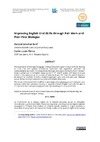Identificador persistente para citar o vincular este elemento:
https://accedacris.ulpgc.es/jspui/handle/10553/70344
| Campo DC | Valor | idioma |
|---|---|---|
| dc.contributor.author | Sánchez Ruiz, Raquel | en_US |
| dc.contributor.author | Lucas Pardo, Sonia | en_US |
| dc.date.accessioned | 2020-02-19T07:23:52Z | - |
| dc.date.available | 2020-02-19T07:23:52Z | - |
| dc.date.issued | 2016 | en_US |
| dc.identifier.issn | 1133-1127 | en_US |
| dc.identifier.uri | https://accedacris.ulpgc.es/handle/10553/70344 | - |
| dc.description.abstract | The importance of the English language in today’s Education system is beyond doubt. Bearing in mind that the Spanish Educational Authorities and regulations advocate the Communicative Approach, this study shows the origin, evolution and results of an innovation project carried out in the English classes at the 4th, 5th and 6th grades of Primary in a state school in the autonomous community of Valencia (Spain). For that, the authors-teachers employed the methods of action research approach, pair work and peer-peer dialogue supported by the Communicative Approach and collaborative work. The results will demonstrate the different advantages of employing pair work and peer-peer activities within the classroom not only to improve children’s English oral skills but also to contribute to their own personal growth and their development as social citizens. | en_US |
| dc.description.abstract | La importancia de la lengua inglesa en el sistema educativo actual es innegable. Considerando que las Autoridades Educativas españolas y las disposiciones legales vigentes propugnan el Enfoque Comunicativo, el presente estudio muestra el origen, evolución y resultados de un proyecto de innovación llevado a cabo en las aulas de inglés de los cursos, 4º, 5º y 6º de Primaria en un colegio público de la Comunidad Valenciana (España). Para ello, los autores-profesores emplearon los métodos de investigación-acción, trabajo en parejas e interacción entre pares, apoyándose a su vez en el Enfoque Comunicativo y el trabajo colaborativo. Los resultados reflejarán las distintas ventajas de utilizar el trabajo en parejas y actividades realizadas por pares en el aula no solo para mejorar la destreza oral de los alumnos en inglés, sino también para contribuir a su desarrollo personal y como ciudadanos sociales. | en_US |
| dc.language | eng | en_US |
| dc.relation.ispartof | LFE. Revista de Lenguas para Fines Específicos | en_US |
| dc.source | LFE. Revista de lenguas para fines específicos [eISSN 2340-8561], v. 22 (1), p. 170-189 | en_US |
| dc.subject | 570107 Lengua y literatura | en_US |
| dc.subject | 550510 Filología | en_US |
| dc.subject.other | Classroom research | en_US |
| dc.subject.other | Action research approach | en_US |
| dc.subject.other | Foreign language teaching-learning | en_US |
| dc.subject.other | Pair work | en_US |
| dc.subject.other | Peer-peer dialogue | en_US |
| dc.subject.other | Primary | en_US |
| dc.subject.other | Investigación en el aula | en_US |
| dc.subject.other | Investigación-acción | en_US |
| dc.subject.other | Enseñanza-aprendizaje de la lengua extranjera | en_US |
| dc.subject.other | Trabajo en parejas | en_US |
| dc.subject.other | Interacción entre pares | en_US |
| dc.subject.other | Primaria | en_US |
| dc.title | Improving English Oral Skills through Pair Work and Peer-Peer Dialogue | en_US |
| dc.type | info:eu-repo/semantics/article | en_US |
| dc.type | Article | en_US |
| dc.identifier.doi | 10.20420/rlfe.2016.0095 | en_US |
| dc.investigacion | Artes y Humanidades | en_US |
| dc.type2 | Artículo | en_US |
| dc.identifier.ulpgc | Sí | es |
| dc.description.esci | ESCI | |
| dc.description.dialnetimpact | 0,0 | |
| dc.description.dialnetq | Q1 | |
| dc.description.dialnetd | D3 | |
| dc.description.erihplus | ERIH PLUS | |
| item.grantfulltext | open | - |
| item.fulltext | Con texto completo | - |
| Colección: | Artículos | |
Citas de WEB OF SCIENCETM
Citations
1
actualizado el 08-feb-2026
Visitas
392
actualizado el 15-ene-2026
Descargas
285
actualizado el 15-ene-2026
Google ScholarTM
Verifica
Altmetric
Comparte
Exporta metadatos
Los elementos en ULPGC accedaCRIS están protegidos por derechos de autor con todos los derechos reservados, a menos que se indique lo contrario.
